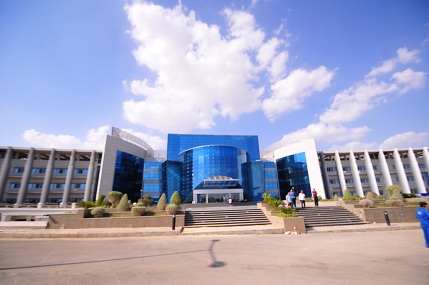By Alan Baldwin /Reuters
SHANGHAI: Formula One chiefs gave next week’s Bahrain Grand Prix the green light on Friday despite security concerns and calls from anti-government activists for the race to be cancelled.
The governing International Automobile Federation (FIA) declared in a statement that the race, cancelled last year after a bloody crackdown on pro-democracy protestors and in doubt again due to ongoing violence, was on as scheduled.
It said the decision followed regular briefings from senior diplomats and “independent experts” in the Gulf kingdom.
Formula One’s commercial rights holder Bernie Ecclestone, mobbed by reporters after a meeting with representatives of the 12 teams at the Chinese Grand Prix, declared the race “200 percent” certain to go ahead.
“All the teams are happy to be there,” added the 81-year-old. “There’s nothing happening. I know people who live there and it’s all very quiet and peaceful.”
He was speaking only hours after an explosion damaged two cars in Manama. Al Arabiya television said the blast was caused by a gas container thrown among vehicles on a street.
A home-made bomb wounded seven Bahraini policemen, three seriously, during a protest near the capital on Monday.
Christian Horner, principal of world champions Red Bull, side-stepped a question about whether he was happy to go but said he respected the FIA position.
“I think it’s clear. The confusing thing has been uncertainty so I think for everybody here in the paddock now it’s clear that there will be a race in Bahrain next week,” he told reporters.
The Bahrain International Circuit welcomed the decision and said it was ready.
“The BIC has been clear throughout recent weeks and months that the security situation in Bahrain is suitable for the staging of a major sporting event,” it declared in a statement.
“This assessment has been provided by experienced figures, from both inside and outside the Bahraini government, to motor racing entities which have travelled to Bahrain to do their own research.”
The timing of the FIA statement, released a day before its French president Jean Todt is due to arrive at the Shanghai circuit, was seen as a clear sign of the governing body’s determination to set the agenda.
“Based on the current information the FIA has at this stage, it is satisfied that all the proper security measures are in place for the running of a Formula One World Championship event in Bahrain,” the statement said.
“Therefore, the FIA confirms that the 2012 F1 Grand Prix of Bahrain will go ahead as scheduled.”
The race at Sakhir, which brought in more than 100,000 visitors and half a billion dollars in spending when last held in 2010, will be the fourth round of the 20-race season.
Last year’s event was scrapped after an uprising in February by mostly Shia pro-democracy demonstrators demanding a greater say in government and better access to jobs and housing.
Bahrain’s monarchy quashed the revolt with the help of security forces from Saudi Arabia, and more then 30 people have been killed. Some opposition activists have dubbed the race a “tool of repression.”
Rational decisions
Another factor weighing on a tense situation is the health of jailed rights activist Abdulhadi Al-Khawaja, on hunger strike for two months, who was moved to a military hospital this week with conflicting reports about his condition.
The FIA statement said the governing body had to make “rational decisions” based on information provided by the Bahrain authorities and Ecclestone.
Todt, who was supported by Bahrain in his election campaign and visited the country last November on a “fact-finding mission” after the calendar was ratified, had made no secret of his desire for the race to go ahead if conditions allowed.
The race also contributes some $40 million in hosting fees to Formula One’s coffers and Ecclestone told Reuters last month that the sport would be there “for as long as they want us.”
The first country in the Middle East to host a grand prix, making its debut on the calendar in 2004, Bahrain has considerable influence in Formula One with a representative on the FIA’s decision-making World Motor Sport Council.
The country’s sovereign wealth fund Mumtalakat also owns a significant percentage of McLaren Group, whose team are currently leading the Formula One championship.
Bahrain’s Sunni Muslim rulers are eager to bring back the race as part of their efforts to show progress on reconciliation and reform with the majority Shia community.
Most Formula One drivers, who will have extra security for the race, have shied away from voicing opinions on the political situation but Red Bull’s Australian Mark Webber tried to put the grand prix into perspective.
“Ultimately it’s a car race,” he said. “There are a hell of a lot of people in the world who don’t have a clue there is a grand prix in Bahrain next weekend so let’s not get too wrapped up in our own bubble about how important it is.”

